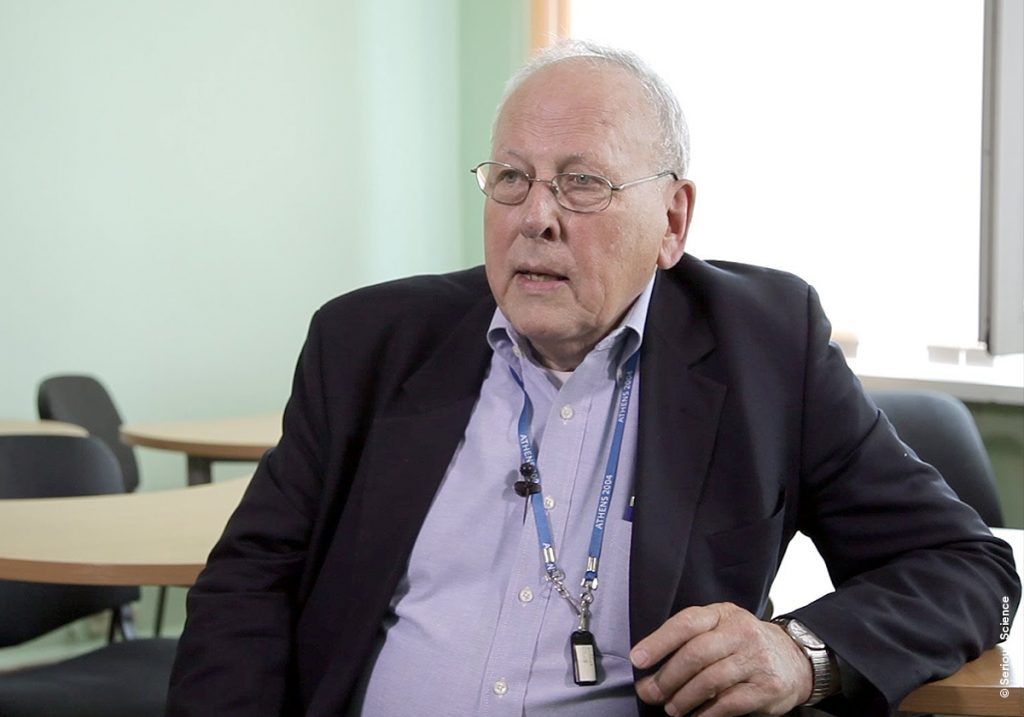«To remind scientists of their own history»: historian Loren Graham on Soviet and Russian science and the fate of Soviet scientists
During the last decade historian Loren Graham had published several fundamental researches on both Soviet and Russian science and their complicated relationship with philosophy. Curator of the new cycle of lectures «Diamat» by Winzavod’s Philosophical club discussed with Graham the meaning of dialectical materialism today, the Lysenko’s affair in the light of of epigenetic researches and asked him why creating sporadic scientific mega projects is not enough for Russian science to develop.
— Let us start from your background and experience in the USSR, that you described in your memoir («Moscow Stories»). You say, you were considered persona non grata. Why?
— The overall record is that between 1960 and the end of the Soviet Union, I visited the Soviet Union many times. But as I remember, I was persona non grata only for a short time — from 1972 to 1976. I do not know why, I was simply told during this period that I was not welcome in the USSR. I don’t think that the reason was very serious, because then they dropped objections and let me come back in. It could be because of some of my publications, it could be because I wrote about my meeting with Trofim Lysenko, who may have had still a few friends in the police.

— Several decades ago you wrote a book on dialectical materialism («Science and Philosophy in the Soviet Union»). «Diamat» is often understood today as nothing, but soviet scholasticism, dogmatism, and ideology. However, you have claimed that — notwithstanding obvious excesses — in terms of its synthetic approach it was one of the most ambitions systems in history of philosophy: you even compare it to Aristotelian scheme of natural order and Cartesian mechanism. I guess, today there is a demand for a «big theory», that would generalize knowledge produced by different minor sciences. Could diamat be reevaluated today? What are its advantages and drawbacks?
— There are two ways of thinking about dialectical materialism. The first — and the most common on the popular level — is that it was part of the official ideology of the Soviet Union and part of propaganda and therefore does not deserve much attention. The other way of seeing it is that it was a form of materialist philosophy; and materialism as a philosophy has been with us since the time of the ancient Greeks. In fact, most working scientists today probably have some kind of materialist philosophy under their work.
Dialectical materialism is a little bit more sophisticated than a simple materialist philosophy, since it is non-reductive. It is not based on the assumption that all complex phenomena such as consciousness or emotions can be explained in terms of the movement of the simplest atoms. It asserts that complex things can not be explained in the simplest terms.
Instead, it believes in «levels of being»: there is the physical level, the biological level, the social level. In that way It has an advantage of being non-reductive. And to some people, for instance, to Ernst Mayr, a very distinguished biologist, who was here at Harvard, and in no way a communist and in no way a Marxist, it was appealing. He told me that he believed that his basic philosophy was similar to dialectical materialism for the reasons that I have just given. I have serious doubts, however, that this approach will be revived with the name of “dialectical materialism.” This term is disreputable to most people. But some form of non-reductive materialism, that in fact is very similar to dialectical materialism, and may need to find a different name, will probably come back
— I find «diamat» compelling, because it takes into account nature as a proper subject for philosophy, that was largely neglected by Western philosophers of the 20th century. Today, on contrary, we see an unprecedented interest in nature: from different new materialisms and vitalisms that endow nature with an agency, or on the other hand, certain neo-positivist trends.
— When I was a young man, positivism was a very popular approach here, and as time has gone on, the faith in positivism has faded.
The thought that one could explain a composer writing beautiful music in positivistic terms, when you think about it, is absurd.
There is now a more interesting philosophy of science called holism that might be helpful. The most that such a philosophy could ever be is helpful, and it could never give you precise answers to questions. It just simply gives you a general stance, a general approach, a set of assumptions, as you go. This kind of philosophy is gaining popularity.

— Let us talk about particular subjects of your research. You start with the problem of origins of life and particularly with Oparin-Haldane hypothesis. For instance, in one of the recent popular books on this subject that I have read («The origin of life. From the nebula to the cell» by Mikhail Nikitin) the whole discussion starts with Oparin's name. The author describes theory of abiogenesis and primordial soup, but does not describe three different levels of being (physical, chemical, social), and Marxist dialectics that crucial for their concept.
— Oparin is still considered a pioneer in studies of the origin of life. That does not mean that modern day scholars, studying the origin of life, accept all of Oparin’s views. But they do frequently recognize him as the person who opened up the field. We are still studying the field and he was the one who made it a respectable, legitimate and important field of study.
Modern scientists — as I am sure you know — do not really pay much attention to the history of their fields. They simply work on the problems that are most relevant to them.
The fact that Oparin and Haldane were Marxists and that they believed that Marxism was important to their work — that is not noticed or talked about. Many scientists today working on the origin of life might say that their field was really begun by Oparin, but they are not interested why, how, or what were the philosophical impulses that Oparin possessed. They want to solve their problems within the framework of a DNA approach -- something Oparin did not do. It is up to historians like me to remind them of their history, how they got to where they are now.
— In the Soviet times, one of the most heated discussions was the famous opposition between nature and nurture. Today we can witness its echoes, for instance, in Steven Pinker, who spoke militantly against the theory of a «blank slate». I guess, that due to cognitive science, behavioral genetics, evolutionary psychology and neuroscience the stick is bent now to the «nature» side. What is state of this discussion and what Soviet authors (Alexander Luria, Alexei Leontiev, Lev Vygotsky) can contribute to that?
— Vygotsky is for sure still popular among psychologists in the West. Here again his philosophical points of view are unimportant to these people, unlike his psychological views. In fact, when Vygotsky's works were translated into English his sympathetic views of Marxism were taken out. The reason they were taken out was that the translator assumed that such statements were just enforced ideology, that Vygotsky had to do this because he was forced to do so by his bosses and censors. That is not true, Vygotsky was a sincere Marxist; Marxism in his work, in my view, is substantial. Vygotsky is better known than Luria in the West.
There is a big debate going on and has been going on for a long time between nature and nurture in Western countries too. The specifics of that debate have changed and in particular they have changed as genetics has changed.
The old view, one that is still powerful, is that nothing that happens in the normal life experience of an organism can have a genetic effect — except from such extreme things as radiation that can cause mutations. That view is now changing with the advent of epigenetics.
According to epigenetics, events that happen during the life of an organism can in some circumstances have genetic effects. There is still a great controversy about how many generations such effects may last; there is also controversy about whether higher organisms such as humans are as susceptible to epigenetic change as lower organisms like paramecia. But much has changed, and the nurture view — the camp of the «nurturers» — is, in my view, stronger now than it used to be. However, we should notice that some people in the field would disagree with what I just said.
— Several chapters of your books are dedicated to physics. What is interesting about Soviet physicists?
— In quantum mechanics one of the big debates has been and still is: Why is it that the description of elementary particles is probabilistic? Why can we not know exactly both the position and the velocity of an elementary particle subjected to a certain force? In quantum mechanics we answer such questions probabilistically. A big question has been: is this because something is going on that we do not know about? And if we could find these «hidden parameters» would quantum mechanics stop being merely probabilistic? Could we then have an exact description? There are still some people who believe that, although they are diminishing in numbers. Einstein himself believed that a deterministic solution could be found. Now most people believe that quantum mechanics is inherently probabilistic. In the Soviet Union this discussion was particularly well-developed, and some Soviet physicists such as Dmitrii Blokhintsev developed rather sophisticated ways of trying to understand quantum mechanics in a way that allowed room for a hidden determinism that we have not yet discovered. They developed some ideas that in their time were worth looking at. However, I do not think this debate is currently as alive as the one over nature/nurture in biology. Nonetheless, it is still there.
— In Soviet times, one of the major scientific obsessions was cybernetics. Some philosophers even claimed that this science (that initially originated in capitalist countries) complements dialectical materialism. One of its main subjects was the nature of information. When I today read certain American scientists I have feeling of a déjà vu. For instance, Seth Lloyd, professor of mechanical engineering and physics at MIT, claims that the universe is just a big computational machine, while Arkadi Ursul came to similar ideas already in the early 1980 writing that information is the universal quality of matter.
— Information is more difficult to define than most people think. It is really a deep philosophical question. Even now there are different opinions on this question.
Cybernetics as a field had an extremely interesting history in the Soviet Union. At first it was condemned in Soviet publications for being a bourgeois or capitalist “tool” driven by the belief that cybernetic machines could eliminate workers. Therefore the proletariat would disappear.
Then later a marvelous transformation occurred in the Soviet Union; people there got interested in cybernetics. Its «father», the MIT mathematician Norbert Wiener, was invited to the Soviet Union, where cybernetics (kibernetika) became celebrated and as you probably know, institutes (instituti kibernetiki) and departments (kafedri kibernetiki) were created all over the Soviet Union. Cybernetics still exists as a scientific field in Russia, but in the United States the word “cybernetics” has almost disappeared, because it is considered too broad a term. And to the extent that it still exists in the USA it is usually connected not with the original science of Norbert Wiener, but instead by more popular ideas about the cyberworld, cyberwarfare, cyborgs, and other concepts which do not have much to do with what Wiener was talking about.

— «Diamat» was compromised by several dramatic incidents that were detrimental to science in general. First of all, due to Lysenko's affair who believed in «inheritance of acquired characteristics». Today with the rise of epigenetics (particularly thanks to discovery of gene expression and the methylation of DNA) — idea of «inheritance of acquired characteristics» was revised and partially accepted, even though still debated. You dedicated the whole book («Lysenko's Ghost: Epigenetics and Russia») to this subject trying to dissociate this discipline with this name. Could you explain, why Lysenko — despite certain superficial similarities — was wrong?
— There has been an effort by some philosophers and even a few biologists in Russia to revive Lysenko and his beliefs (lysenkoism) and to say that he was right after all. And they base these arguments on the fact that the «inheritance of acquired characteristics» is now being accepted more and more, at least in some instances, as I referred to earlier. And therefore, they say, Lysenko was right. But I think this is a gross misunderstanding.
The inheritance of acquired characteristics was not Lysenko’s invention. Aristotle believed in it and many people from Aristotle to the present believed in it. The first thing to say about who Lysenko was is that he was a very poor scientist.
He defended the concept of the inheritance of acquired characteristics very badly. He often used samples of just two or even a sample of one to «prove» things. It is ridiculous the way he worked. In my opinion, Lysenko must be remembered as a bad scientist. And if the inheritance of acquired characteristics is revived that does not mean Lysenko was right. Hundreds of scientists believed in the inheritance of acquired characteristics. The only reason we do not often say this is because we remember Lysenko and we do not remember them. And the reason we remember Lysenko was because he persecuted his colleagues and is responsible for some of their deaths. He should not be given credit for the revival of a theory that has long been around before he came along. But he should be remembered for being a poor and immoral scientist.
— Currently, there is a big interest in science in Russia, more and more popular books are published, while lectures attract more young people. In my view, the books you quote would be considered marginal and do not have a significant readership. I understand that it is important not to forget this historical episode, but do you think that a demonization of Lysenko and personification of responsibility is still productive?
— In my book, I said that the majority of biologists in Russian do not believe that Lysenko was right. But what was remarkable to me is that a few say that he was. For example, this man Zhivotovskii who is in the institute of genetics in the Russian Academy of Sciences, a respected scientist. I found it shocking that he would try to revive Lysenko. I do not believe — and I say so in the book — that science in Russia is once again falling under Lysenko's views. I agree with you, this is a minor event, but this new Lysenkoism is there and any Western biologist who finds out about it is as shocked as I am.
— What are the differences between Soviet science and post-soviet (Russian) science with the introduction of free market and things went out of control?
— The differences are enormous! First of all, Russian science today is not controlled by a political party — namely, the Communist party. And Russian scientists are free to travel, if they can find the money. On the other hand, Russian science today does not have as much financial support as it did in the Soviet Union. So you might say there are both good and bad. The role of the Academy of Sciences has been dramatically demoted. In fact, strictly speaking, the institutes that were under the Academy were put under the Federal Administration of Scientific Organizations (ФАНО). The Academy of Sciences has been reduced to an honorary society that no longer legally possesses scientific research institutions. However, the fight about this is still going on, and there are people in the institutes that used to be in the Russian Academy of Sciences who act as if they still remain in the Russian Academy of Sciences. There are people who say that these institutes may not be under the financial and administrative control of the Russian Academy of Sciences, but are still intellectually bound to, and connected to it and therefore they are still a part of the Russian Academy of Sciences.
— Does the fact that in the light of the recent political events — especially economic and political isolation of Russia — affect science? Or science as an international domain can overcome such obstacles?
— Of course, science suffers in this situation. But science is a world occupation. In contrast to certain moments during the Soviet Union, Russian scientists who can find the money now can travel to international meetings all over the world. Their travel is not restricted, as was the case under the Soviet Union. Soviet scientists could not go to international conferences except as business travel (komandirovki) which had to be approved by their superiors, they could not go off on their own.
I also think that Russian science is now much more closely connected with international science than was the case in the Soviet Union. Nonetheless, unfortunately the severe restrictions on money, severe restrictions on politics under Putin, means that there are real obstacles.
Despite the fact that Russian science is suffering, it is more international than ever before and that is a very good thing.
— In your recent book «Lonely Ideas: Can Russia Compete?» you explain why Russian inventors did not benefit from their inventions and why Russian innovations were not successful. Particularly, you are critical of such projects as Skolkovo and other state-found projects. Alexei Kudrin and German Gref, with whom you had an disagreement earlier, have recently claimed that they would create a “digital state,” they would introduce even CRISPR-сas technology splicing in hospitals. All of these sound absurd...
— I am skeptical. They are top-down, they are not from the bottom-up. Most efforts from the top-down do not really take root and cannot become powerful on their own. When I gave that talk in Saint Petersbourg a couple of years ago, I said that Russians want the milk and not the cow. What I have meant by that was: the Russian government and other institutions want the product, high technology. But they are not so interested in what is necessary for high technology to be produced. That is the cow!
The legal system for intellectual property in Russia is, in my opinion, inadequate. The funding of scientific research is inadequate. The ground for the production of high technology is not fertile enough. Therefore Skolkovo and «science cities» (naukogradi) and so forth do not really work. They have some partial successes, but what Russia needs is to figure out what kind of social, political, and economic atmosphere and environment will automatically produce this kind of things. I do not think Russia has yet succeeded in doing that. It is a great tragedy!
Russian inventors have had very good ideas. Two scientists got Nobel prizes for the invention of the laser, but the manufacture and sale of lasers today is rarely by Russians.
Russia produces less than one percent of all the lasers that are sold in the world. The Russians in other similar fields — in which Russians were way ahead or at least equal to other countries — fell behind in terms of what have been manufactured and sold.

Russia developed the first digital computer in continental Europe. Who buys a Russian computer today?
Being ahead at the beginning does not help much in terms of changing your economy into a knowledge economy. Russia is today — as it has been a for long time — a resource-based economy, to a distressing degree dependent on oil and gas and not on the sale of high technology. It is not a knowledge economy. Why should such small countries as Switzerland and Israel sell more high technology on the international market than Russia does? Therefore instead of merely looking for how Russians can produce high technology, Russians should be looking at how could they can create a society where high technology, once developed, can become something that could be sold on the world market. That is where Russia is weak.
— What is the most interesting field of science today, that one should follow?
— The really important subject right now — but I am not a specialist in it — is artificial intelligence. Is it going to become our master? Is it a threat to a society? Some very important people like Bill Gates and Stephen Hawking (who has just died) fear that artificial intelligence may become autonomous like some Frankensteinian monster, escape from us and begin to dominate us. Is that true? I do not have an answer, but I think that this is a very important question.
Перевод интервью на русский язык можно прочесть здесь.
